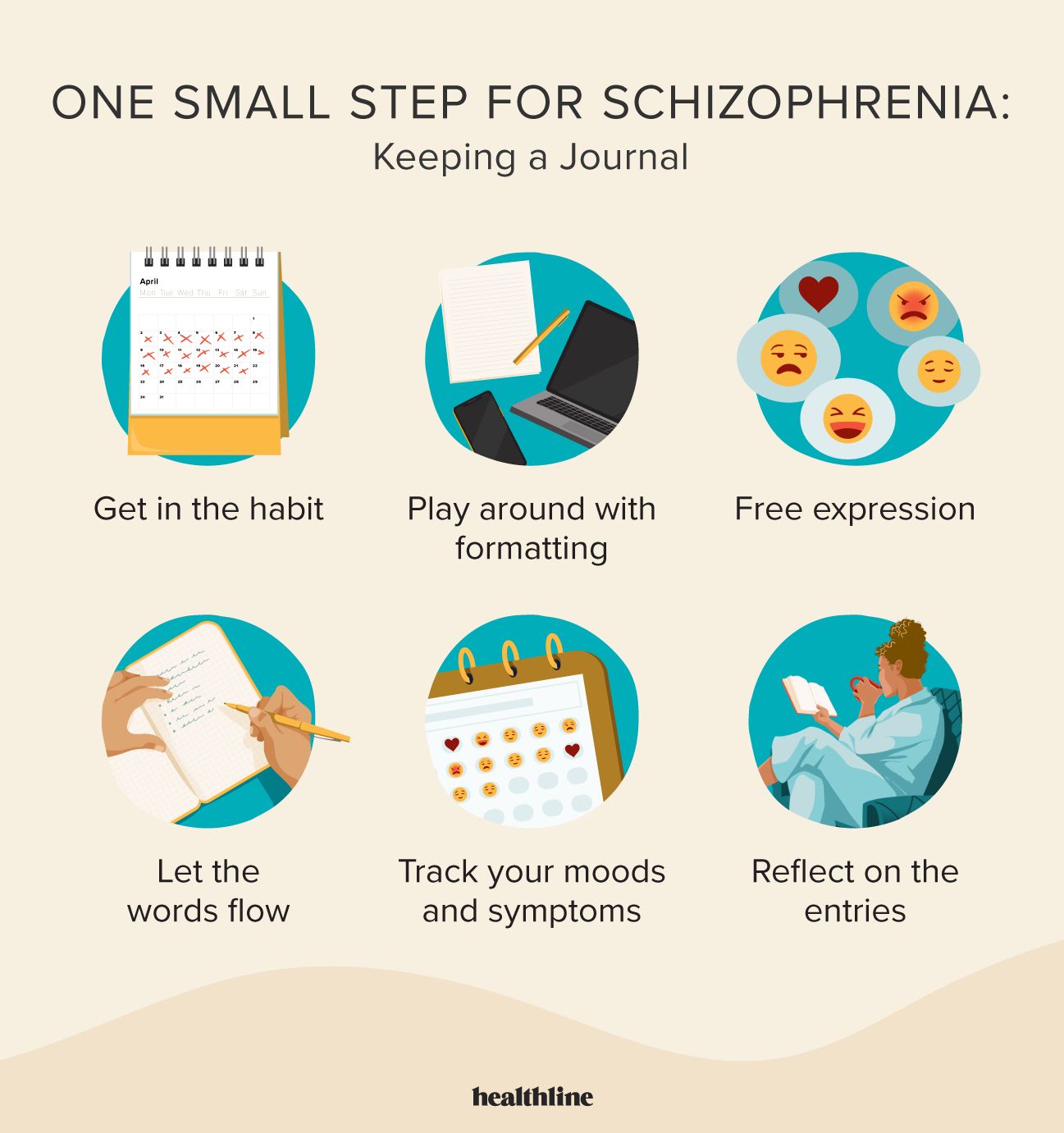Journaling is one tool you can use to manage schizophrenia symptoms. It can help you learn about the connection between your daily experiences and your mental health.
Hallucinations, delusions, and unusual or illogical thinking are some of the
Medications and talk therapy are important elements in the treatment plan to manage your symptoms. You can help make your treatment more effective by becoming aware of specific symptoms and what might cause them.
Journaling is one simple, accessible tool that can help you identify and track your symptoms. It can also help improve mental function. Writing things down might help you better organize your thoughts and regain focus.
Here are a few tips on how to start this small step of keeping a journal.
If you’re new to journaling, you might want to set time aside every day to write until it becomes routine. Don’t worry about missing a day. Sometimes just a few journaling sessions can still improve mental health.
Not everyone writes in their journal every day. Some do so only when they are experiencing challenges or want to work through some of their thoughts and feelings.
According to a 2022 research review, there’s evidence that journaling can help with mental health conditions like anxiety, post-traumatic stress disorder (PTSD), and depression.
Depending on your personal experiences with schizophrenia, you might keep journaling in your toolkit of ways to manage symptoms over the long term.
A journal is a place for you to set down your thoughts without regard for grammar or style. Sometimes, it’s easier to write a collection of phrases instead of full sentences. A poem or word cloud can also be a way to express what you are thinking and feeling.
You might find writing by hand to be more effective than using a smartphone or computer.
A 2022 study found that calligraphy might contribute to a reduction in positive symptoms of schizophrenia, as well as improve attention and cognition. Positive symptoms are ones that people with schizophrenia experience in addition to their typical functioning, such as hallucinations or delusions.
One therapeutic
The most important thing is to journal in a way that works for you. If you’d rather not take pen to paper, jotting down notes on your tablet or phone can still be a great way to get the benefits of journaling.
Sometimes your thoughts can make you feel angry, guilty, or sad. A journal is a place to let those feelings out, even if you find them embarrassing or shameful. Try not to attach any emotions to what you write in your journal.
Journaling can be a way to reflect on your personal life experiences. Writing out intrusive or racing thoughts and then reading them back can help you gain a different perspective. This might help create a greater understanding of personal trauma.
By allowing yourself to be honest in the space of your journal, you can gain the therapeutic benefits of writing as a mental health tool.
It can be tough to know what to write in a journal, even if you’re not constrained by proper grammar or any specific formatting. Try writing any sentences you can think of, such as “I am using this pen to write in this journal.” You can go on to describe your day, even if you don’t feel like anything interesting happened.
The physical act of writing, whether it’s on paper or in digital form, can help unlock your ability to express your thoughts. Your description of the chair you’re sitting on might lead you to write about how your body feels and the state of your emotions.
One way to use a journal is to identify triggers for schizophrenia symptoms. Consider noting how you felt while you wrote each entry and whether you had any notable experiences.
You can use an icon or emoji system to record your mood and summarize any symptoms in a few phrases or sentences. You might be able to later connect your experiences with schizophrenia to specific events or emotions.
Some people call this a schizophrenia checklist. It refers to a list of challenges you experience with schizophrenia. Making this list helps some individuals distinguish between a symptom and reality.
For some people, the simple act of writing is enough to help manage schizophrenia symptoms. Others find it good to reflect on what they’ve put on the page, either right away or after a few days have passed.
You might also consider sharing some of your journal entries with a mental health professional. Depending on your treatment plan and relationship with the therapist, it might shed light on your daily experiences between sessions.
Journaling can help you organize your thoughts and regain focus. Reflecting on your entries can help you identify schizophrenia symptoms and what might bring them on. You might choose to share some of your journal with a mental health professional if it helps with your treatment and symptom management.





